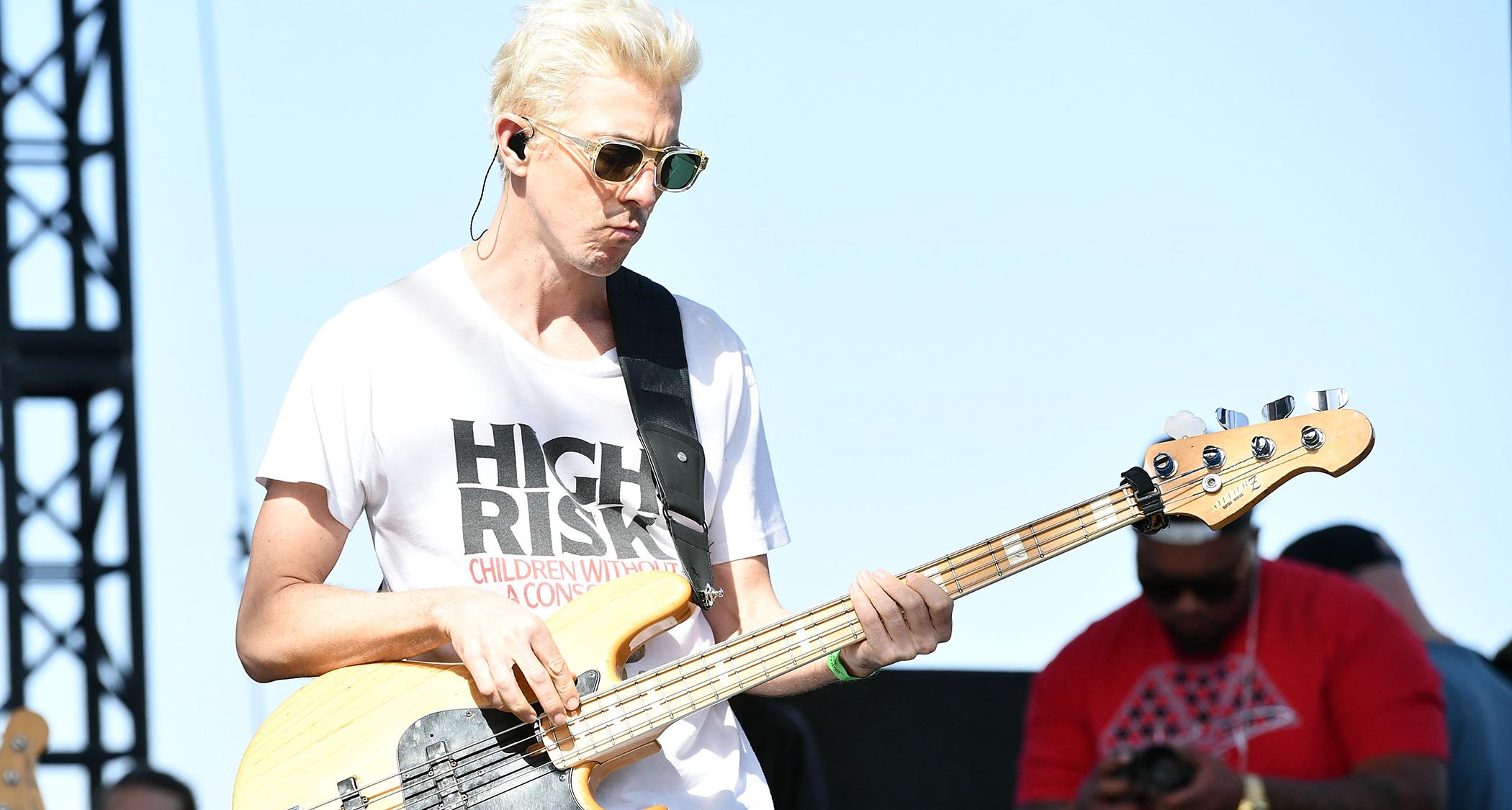Why Jeff Beck was the guitar hero's guitar hero: Steve Vai, Joe Satriani, Vince Gill, Steve Stevens and more pay tribute
Some of guitar's greatest names share how Beck influenced their own playing, praising his mastery of the space between the notes and relentless pursuit of innovation
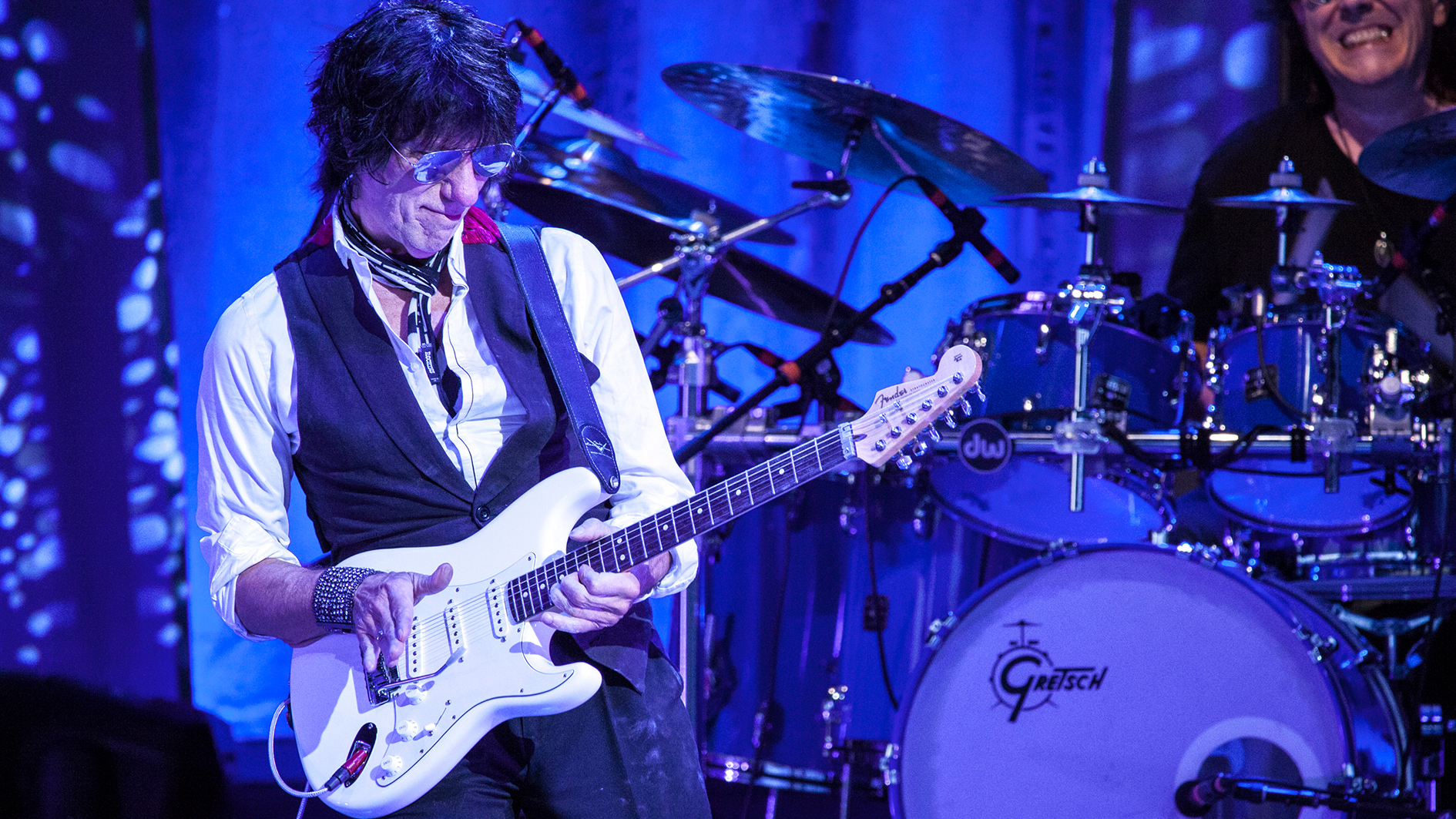
All the latest guitar news, interviews, lessons, reviews, deals and more, direct to your inbox!
You are now subscribed
Your newsletter sign-up was successful
While the concept of the guitar hero is as old as rock ‘n’ roll itself, new heroes arrive for each new generation – with only the most remarkable players earning an immunity to the sands of time, capable of wielding influence over generation after generation after generation.
Jeff Beck was the player other greats seemed to most commonly point to when asked who they believed to be truly worthy of the title – he was truly the guitar hero’s guitar hero.
Throughout a monastic life of guitar playing and a career chiefly marked by perpetual reinvention, Beck provided seemingly infinite innovation on the instrument. Combining an otherworldly, fluid, dynamic touch, brilliant melodic sensibilities and a holistic approach that used every last bit of the guitar, Beck’s playing was something that, at its best, transcended the instrument altogether.
It became a disembodied voice screaming out from the bowels of a Marshall, a mythical Siren escaping the guts of a Strat only by the will of a tricky finger flicking a volume knob. The man could be seen applying chalk to his hands before he played, but the chalk might as well have been magic pixie dust, because there really was no worldly explanation for the raw emotional content Beck could dredge from a guitar.
In 2021, we gathered noted players from varied genre and generation, all titans of the instrument in their own right, to celebrate the true champion of the guitar that was Jeff Beck.
Our panel included Steve Vai, Steve Stevens, Vince Gill and Joe Satriani, plus relative newcomers Tyler Bryant of Tyler Bryant & The Shakedown and Bones UK guitarist Carmen Vandenberg, who shared electric guitar duties with Beck on his final solo studio album, 2016’s Loud Hailer, an album that she also helped write.
While their respective voices on the instrument are unique and diverse, every member of our panel was bound by deep admiration for the great innovator from Wallington, England, a guitarist who changed the game time and time again.
All the latest guitar news, interviews, lessons, reviews, deals and more, direct to your inbox!
He will be sorely missed.
Steve Vai
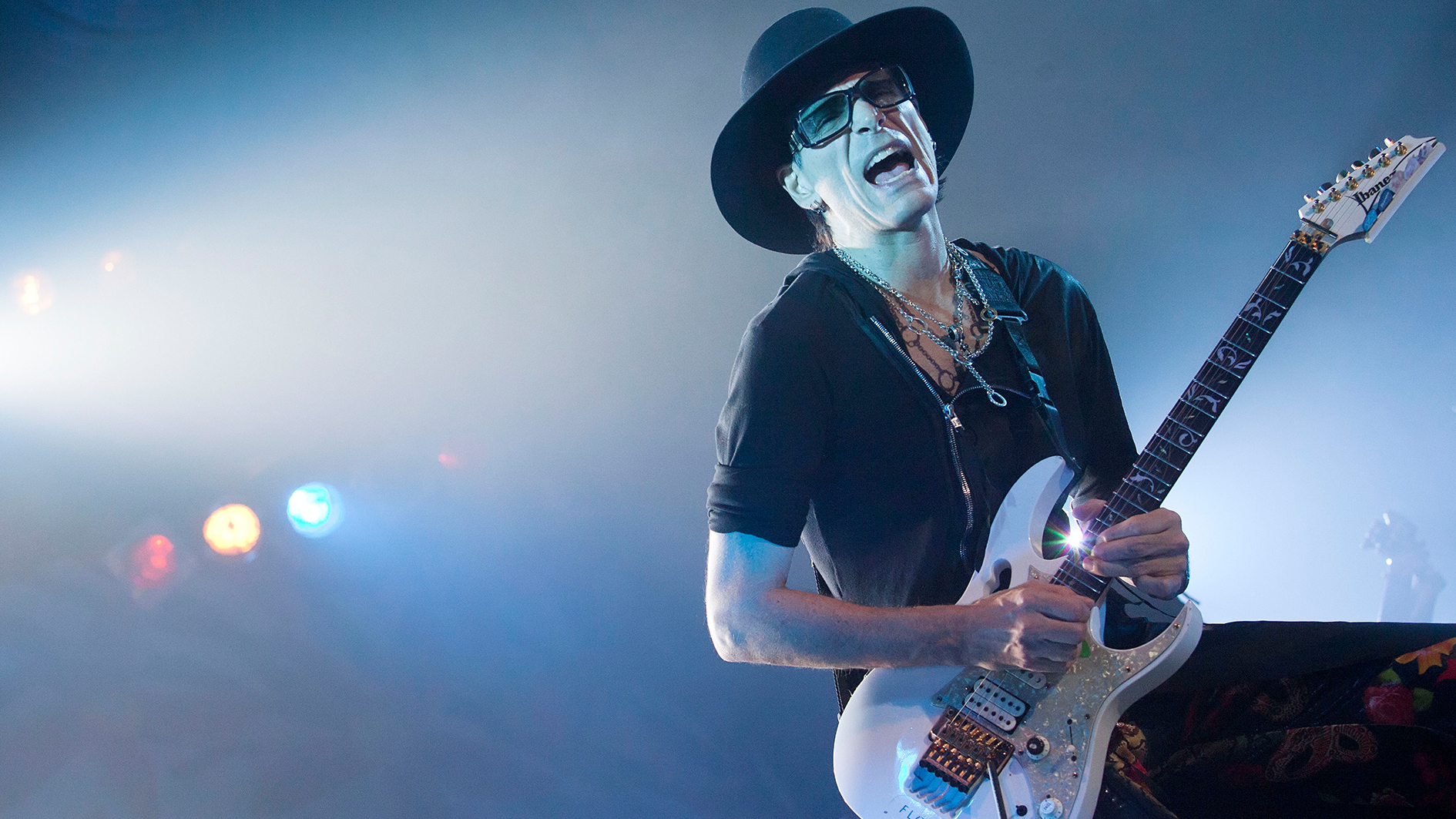
What was your point of entry to Jeff Beck’s music?
"I was a kid and I heard Cause We Ended as Lovers [from 1975’s Blow by Blow]. I had never heard anyone craft an instrumental like that before. Beck had switched from a Les Paul to a Strat at that point and he squeezed every tonal color you possibly could out of the thing.
"He’s really like a craftsman, and I’ve watched in stunned disbelief at how he can hit one note and do things to that one note that no one else can touch."
I see a direct line between what you do as a stylist and as an expressive player and what Beck does.
"It would be impossible for his influence to have not floated into my playing somehow. I was such a fan and I learned those songs as closely as possible when I was a kid. Blow by Blow and Wired [1976]? I learned every song on those records – and I think they’re beyond masterpieces."
You interview me and you get deep, esoteric conversation about guitar, but Beck has always been very simple in conversation about this stuff. The way he plays is just so profound. Why discuss it?
Steve Vai
They’re also very much the foundation of what guitar heroism would become in the '80s.
"I think you hear more Beck in my playing than a lot of other guitar players from that time. The interesting thing about him is that he’s somehow continued to get better. It’s very inspiring because most people just stop dead in their tracks and stop growing and exploring at a certain point.
"Those are the people that lose the enthusiasm for a good idea. But that hasn’t happened to Beck. It’s so funny too because it almost seems like he doesn’t think about any of it. He doesn’t even talk about it very much. You interview me and you get deep, esoteric conversation about guitar, but Beck has always been very simple in conversation about this stuff. The way he plays is just so profound. Why discuss it?"
What is it about Beck that makes his playing so compelling to other masters of the instrument? What makes him the guitar hero’s guitar hero?
"People want to be able to connect with a guitar player that has all of these elements of stardom and stage presence – the wild clothes and such. There’s an archetype, but when you start peeling back the layers and looking under the hood at the actual playing, very few people have the horsepower.
"Beck is one of those guys that really has it where it counts. Beck has always continued to expand his craft in artistic ways and it’s through the guitar that he does that. There’s not extraneous disruptions or focus on having to create a big rock show or any other distractions."
Steve Stevens

What was your point of entry for Jeff Beck?
"Blow by Blow, but then I went back and listened to Beck-Ola [1969] and Rough and Ready [1971] and all of those records. I started with Blow by Blow because my cover band did Blue Wind and Freeway Jam. Those were successful records and they sold a ton, so you could play ’em in a cover band!"
You were still a teenager. How difficult was it learning those songs?
"It was tough because I had to borrow a friend’s Strat because I didn’t know how he was doing some of the whammy bar stuff. That was actually my entry into using a whammy bar.
"The thing about Jeff that transcends the theatrics is his sense of rhythm and groove. The foundation to me of all of his stuff comes from old rock ‘n’ roll; you can hear Cliff Gallup and Chuck Berry and all of the things Beck grew up with as a kid as the foundation for his work.
"Obviously he built upon that with some pyrotechnics – and hiring [producer] George Martin to do the record didn’t hurt! But you can put on Blow by Blow and people that don’t even give a shit about guitar can enjoy that record; it doesn’t matter what instrument he’s playing because it’s so gorgeous."
Beck always seems to progress as a player.
"He’s still obviously a music lover; however, he’s had to do to rediscover that, whether it was through Bulgarian chants or Indian melodies. It seems he constantly becomes a fan of new things.
"When he did his techno and electronic-music-inspired records, he was paying attention to what was happening with bands like Massive Attack and the Chemical Brothers. It seems he’s always looking outside and beyond the guitar for inspiration. I kind of try and do that, too, through film soundtracks or classical music or anything outside of guitar. It can really enhance your approach to guitar.
"The interesting thing is that despite being a formidable showman and the fact that he really started that image – I don’t care what anyone says, Jeff was the first guy with that particular haircut and look – he doesn’t lead with his ego.
"All of those tunes people really know him for were written by keyboard players, whether it was Tony Hymas or Max Middleton or Jan Hammer. Beck is a smart enough guy that he knows to work with great writers and knows that if he’s given a great melody, he can deliver it in a special way."
In your book, why is he the guitar hero’s guitar hero?
"You never know quite what he’s going to do next because it’s always unexpected, and whatever it is that’s driving him, he just gets better!
"From the blues-based Jeff Beck Group stuff, which, let’s face it, was the first Led Zeppelin – maybe without the production or John Bonham – but to take it from there and develop that lyrical vocal thing through the Blow by Blow and Wired era, to the way he went into electronic stuff in the '90s… he’s just had so many unique phases throughout his career and he’s been so innovative and unique.
"The reinvention has worked over and over again and he’s playing big venues again and is a true guitar superstar; he’s kind of the one, if you ask me.
"When I did my flamenco album [1999’s Flamenco a Go-Go], I had been at a songwriters retreat that Miles Copeland had at this castle in France with all of these musicians, and Jeff Beck was there with Jennifer Batten and had been putting together something with Miles’ brother, Stewart Copeland.
"I’d get up in the morning and they had their own little barn area and I could hear what they were working on while I was having coffee. We all had dinner together around a big table and Jeff always had a guitar in his hands.
I honestly don’t think Jeff cares about other guitar players or any of that shit; I don’t even know if he’s aware of what we all do; it seems to me like he’s just on his own path
Steve Stevens
"I wasn’t playing electric guitar when I was there; I was working on tracks with a French-Algerian singer named Faudel Belloua, and I remember Jeff hearing some of our stuff and saying how cool it was. Jeff respected that I had put away my electric guitar for a while and seemed to really dig what we were working on. It was a great experience and it meant the world to have that moment.
"When I went to see him in LA, every guitar player was there and it was almost a competition with who could get back to see Jeff after. It was all, 'I heard Vai’s back there' or 'Sambora made it!' I was just there to see him play, but – of course – we were all there to pay respect and see him do his thing.
"I’m on my third Jimi Hendrix book in six weeks, and Jeff’s name keeps coming up in these biographies: Jimi was so aware of what Beck had done, and although Jimi debuted in England by getting up and playing with Eric Clapton, it was Beck who Jimi was really enamored with."
Vince Gill
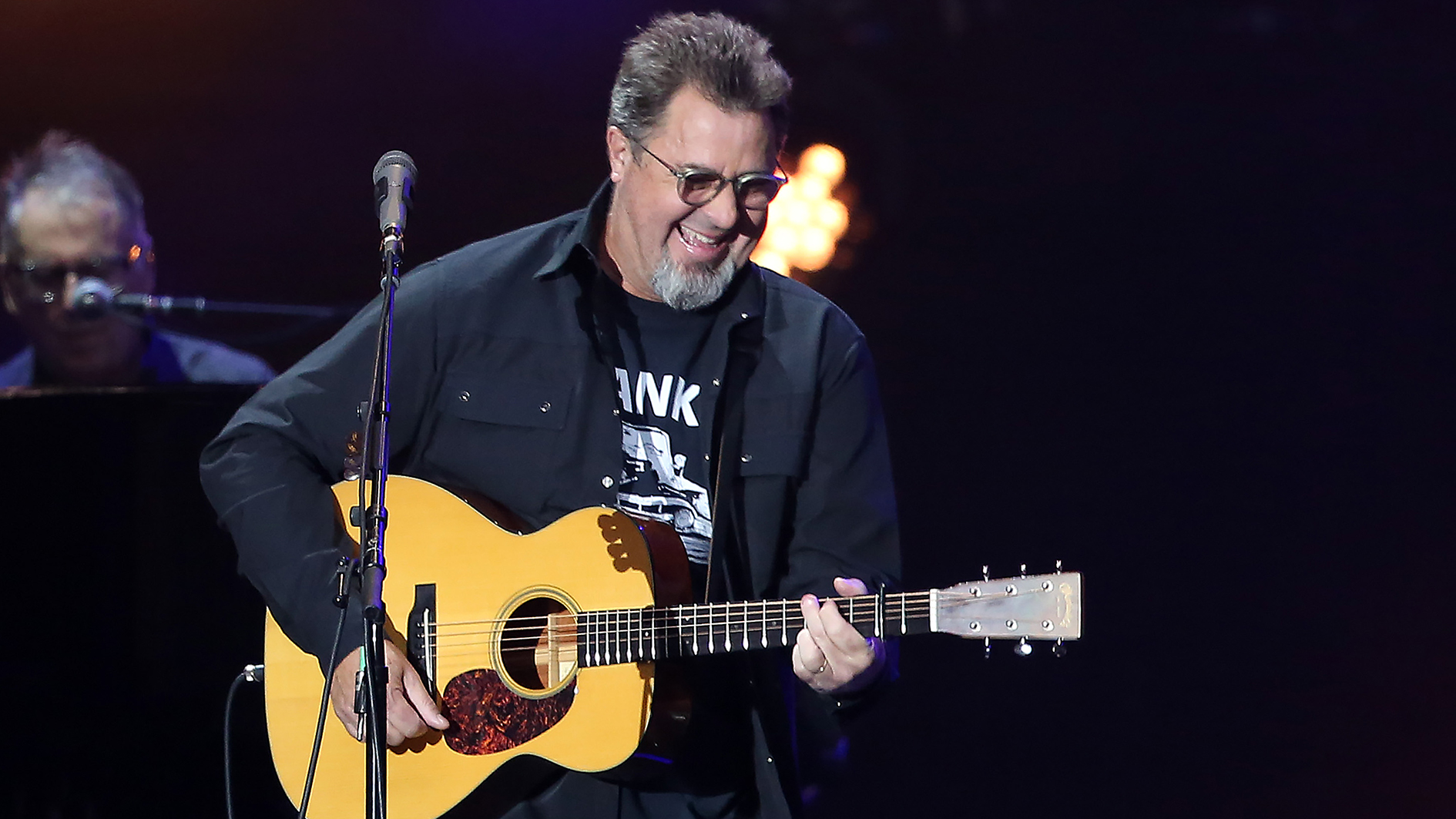
What was your point of entry to Jeff Beck’s music?
"I never got to hear him play live until Eric Clapton started doing the Crossroads Guitar Festival in 2004 – but I had been a fan forever. To hear him in the room and in the air and not on a record is kind of life-changing.
"There was this raised platform side stage where you could watch the sets, and one of my favorite memories from all of those Crossroads shows – and one that shows the beauty of how revered Jeff Beck is – is that when he played, you’d look around that platform and everybody was up there watching him.
There’s a real great art to the space between the notes – there’s a real beauty in his sense of restraint, and the way he uses it to build emotion is really compelling
Vince Gill
"Someone saw that every other guitar player on the bill was up there and said, 'Well… there’s all of us, and then there’s him!' and I feel like that really encapsulates how we all feel about Jeff Beck. He’s magical and gifted in how he hears things to be able to do what he does.
"For me, it’s more the subtleties of the things he does that knock me out; there’s a lot of great players that can blow your mind with information, but for me, the ballad playing and the touch things are more up my alley as a singer/songwriter and a melody nut."
Which Beck record sunk the hooks in for you?
"Probably Blow by Blow. Beck’s one of those players that even if you tried to study his work deeply, you almost certainly couldn’t be able to do what he does. It’s really emotional playing and it’s so much about the way he plays with restraint. It takes a while to learn how to edit yourself and grasp the idea of brevity and only playing what’s necessary, and I didn’t know that stuff when I first started making records.
"I played something on a session way back when, and the producer goes, 'That was great, but this time just play me half of what you know!' There’s a real great art to the space between the notes and that’s what I’m most taken with when Jeff Beck plays.
"There’s a real beauty in his sense of restraint, and the way he uses it to build emotion is really compelling. And it’s all about that bar! Someone I know picked up his guitar one time and said it wasn’t even particularly in tune or set up all that precisely – it’s all in the way he manipulates and maneuvers that bar and makes it go where it needs to go with his ear and that’s as pure as it gets!"
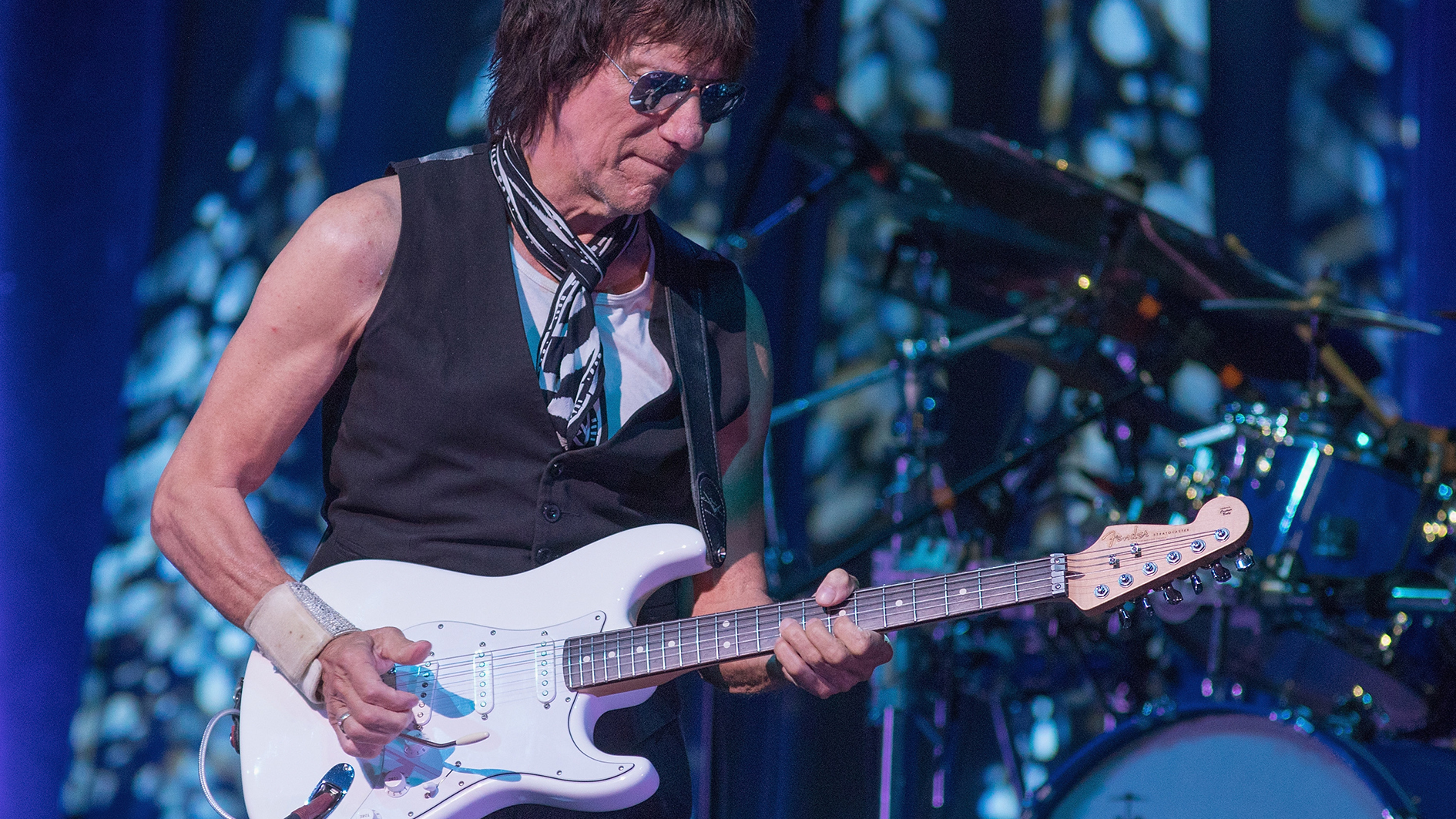
Any thoughts on his constant evolution and what it takes to stay in that mindset?
"I think most musical people like to do what’s appropriate and play what a song requires. I’ve been making records for 45 years and for the most part they’re not about guitar playing; they’re about a song and the performance of a song. Nashville doesn’t revolve around guitar first, you know?
"I knew that people would discover that I could play the guitar, but I didn’t want to try and convince them of that on my records so much. So of all the playing I’ve done, it feels like so much of it was spent trying to appropriately play what was necessary for a song.
"It sounds like the last record Beck made [2016’s Loud Hailer] is of that same mindset – where it isn’t so much about being a guitar player, but about the songs. On my new record, Okie, I didn’t play any electric guitar or any solos.
"I think the heart of a true musician is focused less on showing off and less on showcasing what you’ve learned and really playing what’s appropriate for a song or trying to showcase a melody.
"That said, one of my favorite compliments I ever got came after I played on an Alice Cooper record many years ago. We’re old friends through golf and I was playing on this record and Alice was listening and he just started laughing. I asked what he was laughing at and he goes, 'I just can’t wait to see my guitar players’ faces when they have to learn this! You’re like the Jeff Beck of country music!' and that was such high praise coming from Alice – and also really funny! Nothing could be further from the truth, but hey!"
Joe Satriani

What was your point of entry to Beck’s music?
"I was in a band in high school and these guys were a bit older than me and educating me in all sorts of stuff, and the drummer in that band showed me Beck’s Bolero.
"From there I went home and asked my older siblings, 'Who is this Jeff Beck guy?' – and I started to get his albums handed to me by them. Once I was really working on guitar, I was always jamming along with Truth [1968] and Beck-Ola and later on Rough and Ready and Jeff Beck Group [1972]."
I noticed when I put on Jeff Beck's records with a guitar at the ready, I found myself waiting around a lot. I thought that was really interesting, the way he kind of hangs out and jumps out and jumps back in
Joe Satriani
So he was a pretty seminal influence for you. What impact did working on those records at such an early point in your life as a guitarist have on you?
"I was listening to Hendrix, everything that George Harrison and Keith Richards were doing, plus Clapton and Pete Townshend – all of the stuff my older siblings had been listening to through the whole of the '60s. Being the youngest of five kids, I inherited all of their records.
"I noticed right away that Beck’s approach to playing guitar in a rock band was completely different; he didn’t arrange his parts or participate with the rest of the band like any of those other guys. Certainly not like Hendrix or Townshend, who played, like, all the time – they kind of played the whole song.
"I noticed when I started putting on a Beck record with a guitar on ready to try and copy what he was doing, I found myself waiting around a lot. I thought that was really interesting, the way he kind of hangs out and jumps out and jumps back in."
It’s funny that of all the athletic playing and jaw-dropping stuff on those records, you honed in on his use of negative space.
"I was just floored by it! I thought it was amazing, and obviously later on when I started making records and reading a lot about him, I started to understand his approach to overdubs and live tracking.
"As you gain experience as a musician, you start to realize that most of us have the same chops and we all have access to the same information, scales and chords, and these days a lot of us can buy or borrow the same gear – so there’s a lot of stuff in our respective tool boxes that are pretty much the same.
"So what makes us different as players really is our decisions - split-second and big decisions. Those little musical decisions really define the personality and attitude of the player. You and I have been on the receiving end of Jeff’s endless stream of super-creative decisions and when we think of Jeff Beck, we really think of all these cool little choices he made."
It rings true that Beck paints with quantity.
"Last time I saw him was a really fun night; me and the guys in Chickenfoot had been recording all day at Sammy [Hagar’s] place and we all jumped in the car and drove over to the Fox Theater in Oakland and we got to see Jeff play.
"It was just so cool to come from a studio where you’re working and go right to a gig and watch the master play. I remember standing on the side of the stage with Chad Smith and we were remarking about what he was playing and what he wasn’t playing because we had just been working on those kinds of decisions.
"Our record-making senses were heightened and in a state of agitation. So, not only were we having fun, but we were soaking it all in. Jeff played everything beautifully but was still really surprising. Everything about what he did was so unique to him and the crowd went crazy for it!"

You’ve been a lifelong student of the guitar and someone that always seems to be striving to progress, and Beck’s ability to progress into his late career has always been really interesting to me. What’s the key to that?
"I’m not going to guess how it works with him, but I can just say he laid the groundwork for me when I was a young player. I saw him constantly innovating and was always pleasantly shocked by how every group of records throughout each specific period of his career was drastically different. But maybe the most remarkable thing is that whenever someone asks me about Jeff Beck, I think of the current Jeff Beck – whatever that may be.
"If you ask me about some other players, I might lean toward their early work but with Jeff Beck, I immediately think of his most recent record.
"How does he make us all feel that the most happening Jeff Beck is the one that’s happening right now? That’s pretty remarkable in an industry that’s so focused on what you did decades ago or your highest-charting thing. It’s a combination of pure talent, constant innovation and fearlessness."
Carmen Vandenberg

What was your point of entry for Jeff Beck’s music?
"It was through one of my lessons at the music school I went to on weekends in the small town where I grew up, which was called Jam Music Academy in Lucca, Italy. Each week we got a song to learn, and one of the exercises was a Jeff Beck song I had to study and I had to go to YouTube to learn it.
"It turned into this mission of discovery after I got into his stuff on YouTube. I went through all of the records after that; Blow by Blow is one of my favorites, though obviously I really like the one [Loud Hailer] that we did together! I’m emotionally attached to that one. I think any guitar player that wants to achieve something on the instrument finds themselves in awe of Jeff at some point."
What impact did working with him so closely have on your playing?
My time with Jeff Beck absolutely changed my playing and my whole perception of what guitar is about and can be
Carmen Vandenberg
"You can only imagine what spending almost a year and a half waking up every day to having Jeff Beck as your mentor… Just watching and listening to him play every day was unbelievably huge for me as a player.
"It was one of the years I learned the most because I was around this man all the time. Jeff let me live in his apartment in London when I couldn’t afford a place and then we did the album at his house in the countryside, and he’s the kind of guy that every morning wakes up and has a guitar in his hands.
"I just started doing the same and trying to replicate what he was doing and his routine. That experience absolutely changed my playing and my whole perception of what guitar is about and can be."
Was there an overarching philosophy you took away from that experience? What was the process like as a co-guitarist?
"It’s the fact that Jeff is always in the pursuit of creating something new. Jeff’s relentless in wanting to learn and he has all these stories about, for example, how he got really into classical music and how that changed his playing… he’s always trying to create something new with his abilities and the sounds he gets and it’s very inspiring. Really just chasing new things.
"We wrote and recorded that album in the space of three months and it was an incredible experience. Jeff had this tour coming and he kind of dumped the album that he had already done and we had a very small amount of time to do the thing.
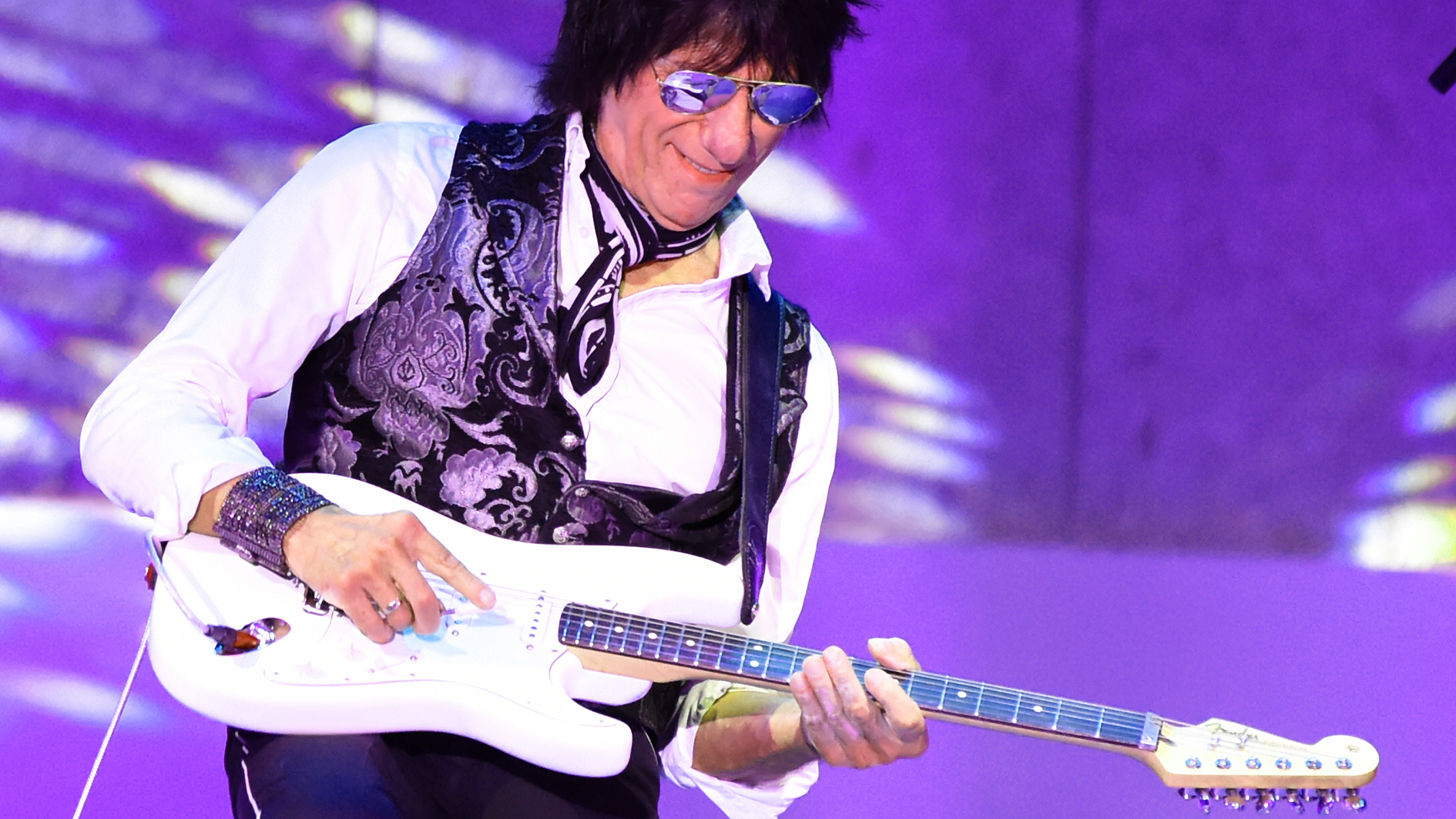
"Jeff wanted to do an album that had lyrics and songs and real topics, so we talked about the concept of what he wanted to talk about and my bandmate Rosie Bones – who is an incredible lyricist – would channel what Jeff wanted to talk about.
"We’d be sitting on these couches in front of the fireplace bouncing riffs off each other and anytime something was good, we’d record it on the phone and a few weeks later our producer Filippo [Cimatti] came around and we started demoing things on his laptop, and off we were!
"It was one of those things you just do and you can’t think about how amazing the opportunity is or the magnitude of what you’re doing while you’re doing it."
What makes Jeff Beck the guitar hero’s guitar hero from your perspective?
"Jeff makes the guitar sing like no one else can. It’s magical and his notes float through the air in a way that doesn’t even sound like a guitar at times. I’ve got goosebumps right now just trying to describe it, but he’s like a lyricist and a rock singer through the instrument and the emotions that he creates with the instrument are just untouchable."
Tyler Bryant

What was your point of entry to Jeff Beck’s music?
"I feel like most people got into him through Wired or Blow by Blow, but my intro to Jeff was the Guitar Shop record [1989]. I was obsessed with Big Block and a lot of the stuff on that album and still to this day, that’s the album cover pinned up to the wall at my parents’ house in Texas.
"I worked my way through the catalog from there. One of my favorite things about Jeff has always been how progressive he’s always been. He was always filed in the same category as Hendrix or Stevie Ray Vaughan – the legendary guys – but you listen to his records and you realize that while Jeff Beck and Eric Clapton are often mentioned in the same sentence, Jeff’s records sound so much more forward-thinking than any of his peers.
"As I was cutting my teeth on all of the major guitar heroes, something that really drew me to Jeff was that he was doing things with his production and his style that were really progressive and that no one else was doing. That was exciting to me.
"I got asked to do an acoustic set opening on a tour for Jeff. I made it a point to never miss one of his soundchecks, so I watched him soundcheck daily and I watched his show daily and he had cabinets pointing toward the back of the stage and I would go and sit behind the cabinets – where all you could hear was his guitar – and bask in it. I really tried to soak up as much as I could."
What did you learn from opening for him?
"One of the things I learned and admired is that he was constantly playing guitar. He never puts down the guitar, and that’s a huge part of where it all comes from. Before the show and after the show!
"Another thing is that he’s always surrounded himself with players that will push him, and I think it’s funny to watch a soundcheck because he’s constantly pushing his band forward. I felt that whenever I got to jam with him, too! He stands in front of you and goes, 'Come on! Come on!' and just pushes you to go further.
"It was absolutely mortifying the first time I got to jam with Jeff because I was out doing an acoustic set and one night I broke a string on my acoustic and I didn’t have a spare acoustic. I grabbed my Strat and finished the show.
"Later that night, Narada Walden – who was on drums with Jeff that tour – came and got me and said, 'Hey, Jeff wants to speak with you,' and I was pretty sure I was going to get kicked off the tour because I was supposed to be playing an acoustic set and grabbed an electric.
I was hanging out with the hip-hop artist Machine Gun Kelly recently and I played him Pull It and he was flipping out about how heavy the beat was and I was like, 'This is a dude in his 70s!'
Tyler Bryant
"I was building up the worst-case scenario in my mind. I walk in there and Jeff goes, 'Hey, do you want to jam tomorrow night?' So I’m freaking out and I tried to keep it cool and said, 'Sure, I’d love to!' and then I asked what song he wanted to do and he goes, 'I don’t know, we’ll figure it out,' and that’s when I started freaking out because every player knows that Jeff Beck songs are not the easiest to play.
"I was following his bus in a van at that point and just checking out his setlists and listening to everything and trying to prepare somehow, but at soundcheck he was like, 'Let’s just do Higher by Sly and the Family Stone', which I knew and it was great. Big fun!
"After a couple of times jamming with him, I have to say that as good as Jeff is on the guitar, he was also as nice as a person to me. That was the first tour I ever got to ride on a bus and it was just one of the greatest experiences of my life.
"I’ve been in the studio and bored with what I was doing. [So I think], 'What would Jeff do?' He’s not regurgitating the same licks, he’s always thinking outside the box. When I go to do a guitar solo, I think it’s great to ask what outside the box might look like and sometimes, outside the box ends up sounding like Jeff Beck ripoffs!"
What’s the key to his continued progression?
"I think he’s always just looking to excite himself. He’s always listening to new stuff. Whenever I think I know where his head’s at, I’m wrong. I think he’s one of the most progressive of all time and definitely the most innovative guitarist of all time.
"A lot of the guys doing really creative things with the instrument today are still pulling ideas from Jeff Beck’s book. I was hanging out with the hip-hop artist Machine Gun Kelly recently and I played him Pull It and he was flipping out about how heavy the beat was and I was like, 'This is a dude in his 70s!' I went out the next day and bought a ring modulator."
